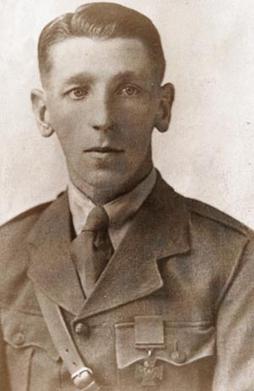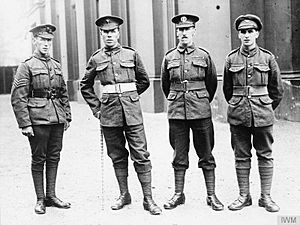Edward Cooper (VC) facts for kids
Quick facts for kids
Edward Cooper
|
|
|---|---|
 |
|
| Born | 4 May 1896 Stockton-on-Tees |
| Died | 19 August 1985 (aged 89) Stockton-on-Tees |
| Buried |
Teesside Crematorium, Middlesbrough
|
| Allegiance | |
| Service/ |
|
| Years of service | 1914–1919 |
| Rank | Major |
| Service number | 2794 |
| Unit | King's Royal Rifle Corps |
| Battles/wars | World War I |
| Awards | Médaille militaire (France) |
Major Edward Cooper was a very brave English soldier who lived from 1896 to 1985. He received the Victoria Cross (VC), which is the highest and most important award for bravery in battle given to soldiers from Britain and the Commonwealth.
What He Did to Earn the Victoria Cross
Edward Cooper was 21 years old during the First World War. He was a Sergeant in the 12th Battalion of The King's Royal Rifle Corps. On August 16, 1917, a very brave event happened at Langemarck, during the Battle of Passchendaele. This is when he earned his Victoria Cross.
The official report about his bravery was published on September 14, 1917. It said:
"Sergeant Edward Cooper showed amazing bravery and quick thinking during an attack.
Enemy machine guns were firing from a strong concrete building, about 250 yards away. They were stopping the soldiers on his left and causing many injuries to his own group. Sergeant Cooper, with four other men, immediately ran towards the building, even though they were being heavily shot at. When they were about 100 yards away, he told his men to lie down and shoot at the building. But this didn't stop the machine guns. So, he immediately ran forward by himself, straight at the guns. He fired his revolver into an opening in the building. The machine guns stopped firing, and the enemy soldiers inside gave up. Seven machine guns and 45 prisoners were captured from this building. Because of this incredibly brave act, he definitely prevented a serious problem for the entire attack. He also saved many lives."
After the War
After the war, Edward Cooper continued his military career and later became a Major. His Victoria Cross medal is now on display at the Preston Park Museum & Grounds in Stockton, his hometown. Major Cooper was cremated at Teesside Crematorium.


